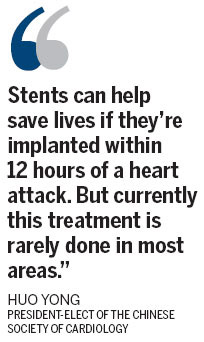Getting to the heart of the matter
Updated: 2012-03-21 13:53
By Shan Juan (China Daily)
|
|||||||||||
 |
There are both too many and too few coronary stent implants operations in China, one of the country's top cardiologists claims.
Huo Yong, president-elect of the Chinese Society of Cardiology, says under use is the biggest problem although some medical workers have been criticized for profiting from unnecessary stent operations.
China performed 332,000 stent implants in 2011, second only to the United States, Ministry of Health statistics show.
"But our population is more than four times that of the US," Huo says.
A coronary stent is a tube placed in the coronary arteries that supply the heart to keep the arteries open to treat coronary heart disease.
It can reduce chest pains and has been shown to improve survivability in the event of an acute myocardial infarction (AMI), also known as a heart attack.
Official estimates suggest there are about 600,000 AMI cases a year on the mainland, but only 20,000 had timely stent implants.
Huo says this relatively low number is mainly due to limited medical capacity and facilities.
"The situation in large cities like Beijing and Shanghai is all right, but it is not so satisfactory in small cities, let alone the vast countryside."
For instance, Linyi city of Shandong province has more than 10 million residents but only one cardiology center. That's well below the international standard of one center for every 1 million people, he explains.
"Stents can help save lives if they're implanted within 12 hours of a heart attack. But currently this treatment is rarely done in most areas," he says.
By contrast, in developed countries like the US and in Europe, more than 30 percent of AMI patients get timely stent implants.
But Huo also concedes that stent implants are only a temporary solution and might cause scar tissue to grow over the stent and lead to clots at the site where the stent damages the arterial wall.
A more permanent and successful way to prevent heart attacks in patients at high risk is to quit smoking, get more exercise and take medications to control blood pressure, ensure cholesterol levels are low and prevent blood clotting, according to the World Health Organization.
In recent years, stent use has boomed on the mainland, and the number of implants increased to 332,000 in 2011 from 180,000 in 2008.
Some experts have expressed concerns that stents are being overused.
Hu Dayi, director of the Center of Cardiology at Peking University People's Hospital, revealed many patients have had five or six stents implanted and some had up to 13.
Actually, few patients need more than three, he says.
"Some doctors overuse stent implants so they can get kickbacks from manufacturers," Hu notes.
A domestically made stent costs more than 10,000 yuan ($1,580) while imported ones cost about 25,000 yuan.
Huo says most stent implants in 2011 were Chinese-made.
Today's Top News
Rescuers race against time for quake victims
Telecom workers restore links
Coal mine blast kills 18 in Jilin
Intl scholarship puts China on the map
More bird flu patients discharged
Gold loses sheen, but still a safe bet
US 'turns blind eye to human rights'
Telecom workers restore links
Hot Topics
Lunar probe , China growth forecasts, Emission rules get tougher, China seen through 'colored lens', International board,
Editor's Picks

|

|

|

|

|

|





